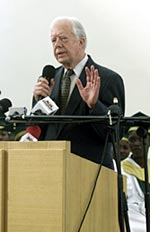Dispatches From Africa

JC: Aso Chapel, Abuja, Nigeria
Today is Sunday, and President Obasanjo kindly invited our delegation to join him and his wife at the chapel next door to the Presidential residence. The president and I share a strong faith in God, and we can both be found in church most Sunday mornings. In my hometown of Plains, I teach Sunday school for anyone who is interested in attending. And this Sunday, Rev. Obaje gave me the honor of addressing the faithful in his chapel and beyond via a national broadcast from the pulpit. President Obasanjo asked that I speak on a subject that we too often ignore in churches and other places of worship, the role of people of faith in the HIV/AIDS crisis.
Speaking from the perspective of faith is no simple task. Nigeria is a land of tremendous diversity. There are 250 ethnic groups and many distinct languages. An estimated 50 percent of the population is Muslim. Forty percent are Christian, and 10 percent hold indigenous beliefs. The two most prominent landmarks in the capital city of Abuja are a gold-domed Mosque and a towering Christian church. The Abuja skyline is a fitting metaphor for its people's beliefs.
Today I asked the congregation, how will we rich and secure people respond to AIDS, the greatest blight facing humanity? And I spoke of the day we will stand before God, who will not look at our wealth or our words, but at what we have done for "the least of these." Though AIDS knows no economic or social boundaries, it is the poor and marginalized who are most vulnerable. AIDS orphans, prostitutes, IV drug users: These are "the least of these" in today's society.
AIDS victims are modern day lepers. Too often we compound the pain and misery of their disease with rejection, fear, and stigma. If we are to be Christians in word and deed, and not just in name, we must follow the example of Jesus who embraced lepers and healed them. To be a Christian literally means to be a "little Christ." We follow in Christ's footsteps when we compassionately care for those with AIDS.
In Nigeria, several Muslim and Christian groups are educating their members on HIV/AIDS and challenging them to provide compassionate care and support to those whose lives have been devastated by this disease. For Nigeria to turn the tide on AIDS, the faithful and faith-based organizations must step up and play a leading role.
BG: Central African Republic
The Central African Republic originally entered our itinerary only as a brief fuel stop between Nigeria and Kenya, but we used the opportunity to visit an HIV/AIDS clinic while we were there. Earlier in the trip, fuel stops in Namibia and Angola allowed us to meet with the American representatives and national leaders there to hear about the unique challenges they face in confronting AIDS.
The Central African Republic has been plagued with political instability. It has a population of 3.5 million in a country the size of Texas, with no coastline, few roads and no railroads. It is one of the world's least developed countries, with an annual per capita income of $310. Most of the population survives by subsistence farming.
We were concerned to hear that the country is having difficulty submitting an application for support to the $2 billion Global Fund for AIDS, TB, and Malaria, because computers are not readily available.
Having heard about our trip focused on AIDS, U.S. Ambassador Sharpless asked us to visit the country's only AIDS clinic, a 10-minute drive from the airport. I will not forget the scene. The streets were lined several deep with residents of Bangui, who had heard of our visit on the radio. Women with babies waved us into a small courtyard where we were welcomed with a traditional dance performed by a group of young men, including one in crutches from a bout with polio.
We were greeted by the first women in the Central African Republic to be treated with Nevirapine, a drug that helps prevent the transmission of HIV from mother to child. She held up her healthy, HIV-negative baby for us to see.
Inside the clinic, which is run and financed by a Japanese NGO, Friends of Africa, we met with several dedicated health workers. Three beds in one small room were occupied by AIDS patients—two women wasting away, barely able to lift their heads.
On the third bed, a child of 2 or 3 lay listless, coughing weakly as his mother and sister watched. Two patients being treated for TB, a disease spread through the air, were separated from the AIDS patients by only a thin curtain.
The director estimated the country's HIV prevalence to be around 15 percent. Yet, when we asked the wife of one of the officials if HIV prevention programs, including condom distribution efforts, were available, it became clear she didn't know what a condom was.
AIDS not only kills, it destroys economies and communities. AIDS has killed half the nation's teachers, who were in short supply even before the epidemic. The nation's rudimentary health system is being strained by the rising number of AIDS cases. Two-thirds of the beds in the nation's only hospital are filled with AIDS patients. It was difficult not to give in to despair.
And yet, as we left the Central African Republic, I was also struck by the hope symbolized by that Japanese-funded clinic—situated in an African town well off the beaten path. While the dedicated staff at that clinic can help only a few, it serves as an example of what could be done across this unfortunate nation.